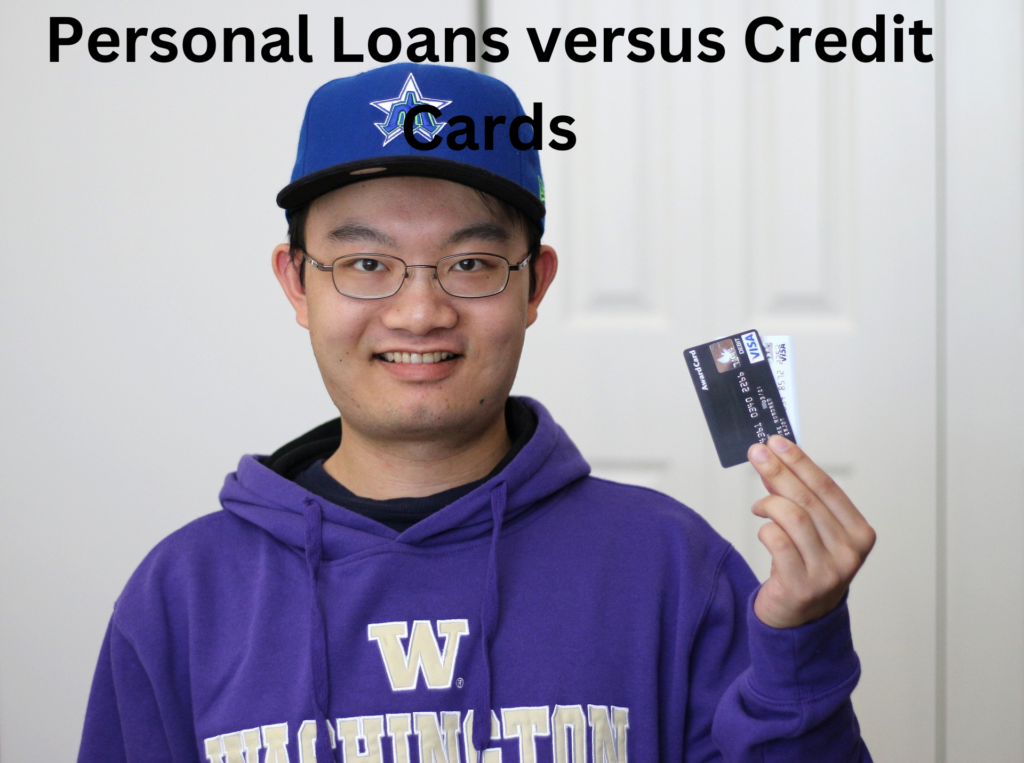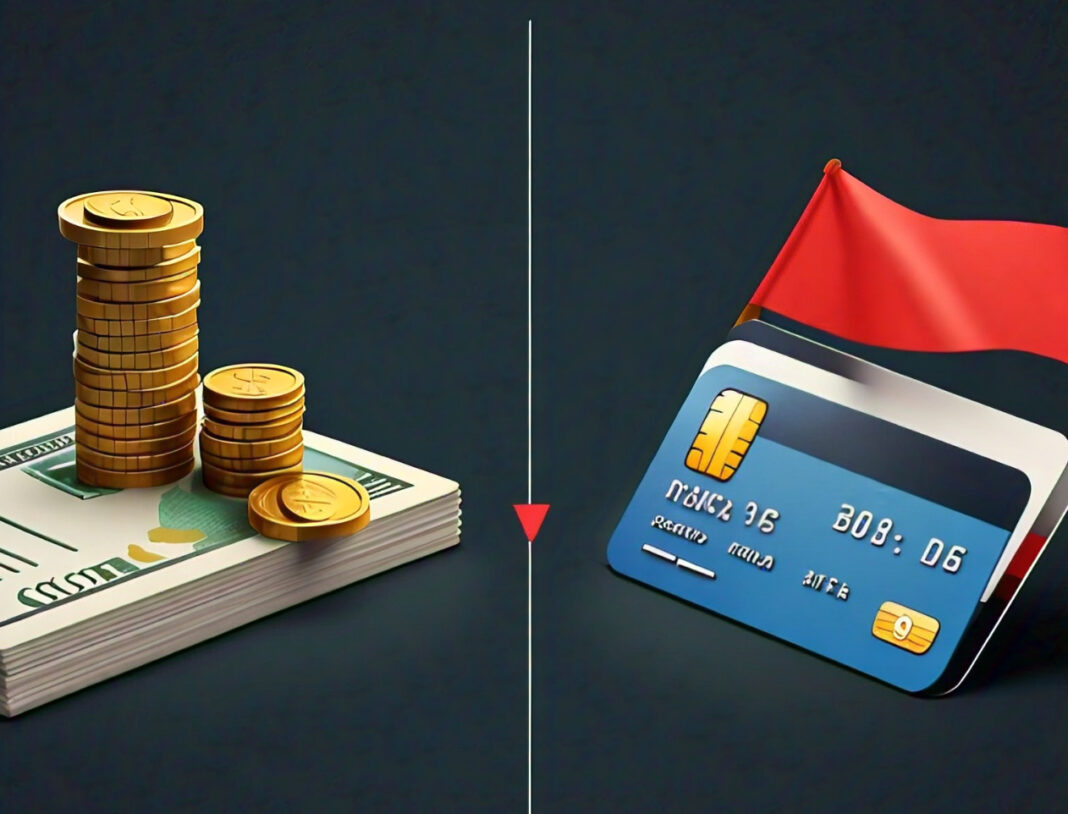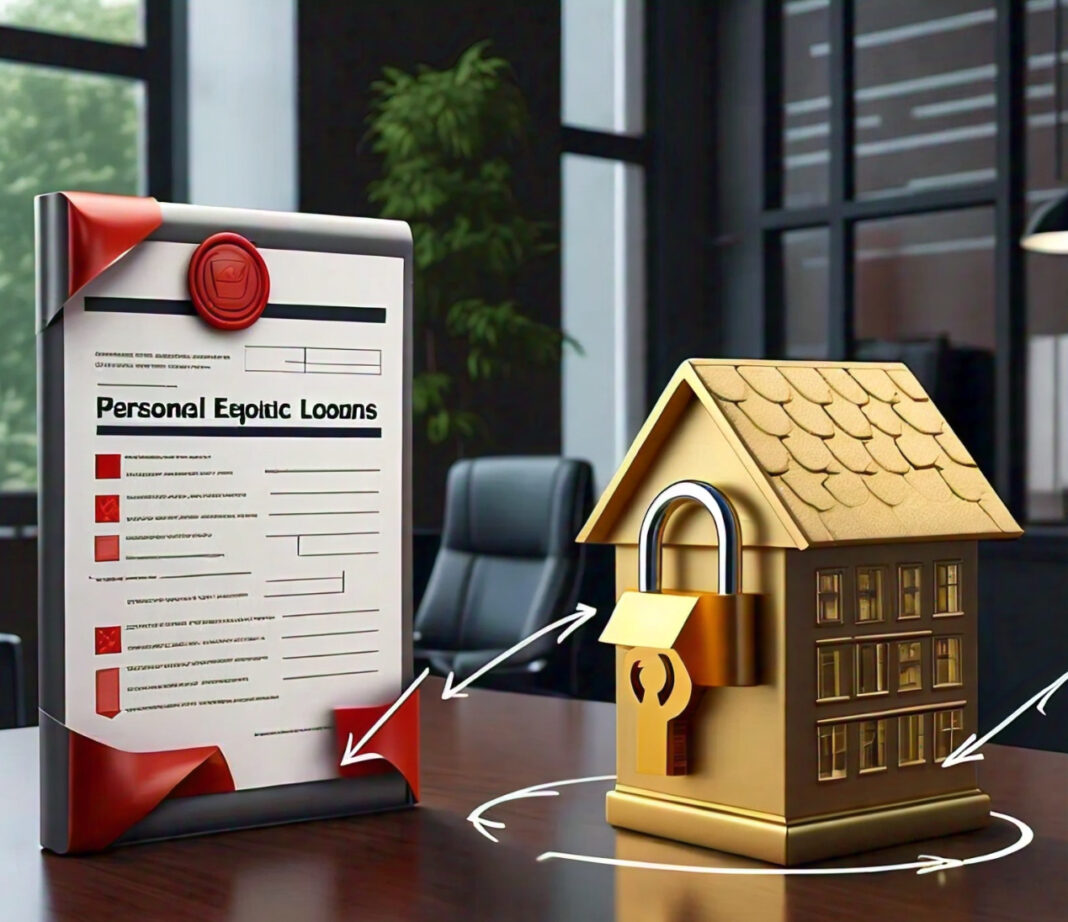In the modern financial world, two of the more common options available to consumers when it comes to borrowing money or making big purchases are personal loans and credit cards. While both serve as ways through which one may access funds, they still are quite different in nature, interest rates, and ultimately in their impact on one’s finances. This article will look at completely comparing personal loans with credit cards to help you make an informed decision based on your situation and goals.

Understanding Personal Loans
What is a Personal Loan?
A personal loan is a fixed sum of money that one borrows from a bank, credit union, or online lender. It must be repaid over a set period of time, usually in monthly instalments. These types of loans are usually unsecured and can be taken out for several purposes, such as debt consolidation, home improvements, or financing large purchases.
Key Features of Personal Loans
Fixed Interest Rates: Most personal loans have a fixed interest rate; hence, the amount you pay every month is the same throughout the loan term.
Fixed Repayment Period: A personal loan has a set repayment period, usually ranging from 1 to 7 years.
Lump Sum: You get the full amount upfront, and you can immediately make big purchases or pay off existing debts in one go.
- No Collateral Required: Many personal loans are unsecured, though secured options exist for those with lower credit scores or who want lower interest rates.
- Varied Amounts of Loans: Personal loans usually start at $1,000 and go up to $50,000 or more, depending on the lender and your creditworthiness.
Advantages of Personal Loans
- Lower Interest Rates: Most personal loans have lower interest rates than credit cards, especially for those with good credit scores.
- Predictable Payments: Budgeting is easier because you know the fixed interest rate, which means you know exactly how much you will be paying month in and month out, along with having the stipulated terms for repayment.
- Debt Consolidation: Personal loans can be very useful for combining several high-interest debts into one, more reasonable payment.
- Improved Credit Score: On-time payments on a personal loan can help you increase your credit score over time.
- High Borrowing Capacity: You can borrow more on personal loans than you can on credit cards.
Disadvantages of Personal Loans
- Strict Approval Criteria: Financial institutions have stricter lending criteria for personal loans regarding income verification and checks on credit scores.
- Possible Fees: Origination fees, early payment penalties, or even charges on late repayments occur with some types of personal loans.
- Inflexible Borrowing: Once you have taken the loan, you cannot borrow more money beyond what you already borrowed without taking another loan application.
- Affects Credit Score: Application for a personal loan leads to a hard inquiry in your credit report, which may reduce your credit score for some time.
Understanding Credit Cards
What is a Credit Card?
A credit card is a type of revolving credit line that lets you make purchases or get cash advances up to a certain limit. You can also carry your balance from month to month, paying interest on the outstanding amount or paying the entire balance to avoid interest charges.
Key Features of Credit Cards
- Revolving Credit: Credit cards extend a flexible borrowing limit that can be repeatedly used as long as you make minimum payments and stay within your credit limit.
- Variable Interest Rates: Most credit cards have variable interest rates, meaning the rate at which interest is payable changes according to current market conditions or your payment history.
- Minimum Payments: You are bound to pay at least a minimum amount monthly, usually a tiny portion of your outstanding amount.
- Grace Period: Most credit cards offer a grace period on purchases, wherein you are not charged interest if you pay the entire balance amount at the end of the month.
- Rewards and Benefits: Most credit cards offer rewards programs, cashback, travel privileges, or other benefits associated with using the card.
Advantages of Credit Cards
- Convenience: Credit cards are acceptable almost everywhere, and they make for a hassle-free purchase sans cash.
- Build Credit: Using a credit card responsibly over time can build or improve your credit score.
- Rewards and Perks: Many credit cards offer cashback, points, or miles that can be used for travel, merchandise, or other statement credits.
- Fraud Protection: Credit cards offer strong fraud protection and are generally safer to use than cash or debit cards for many transactions.
- Flexibility: You can borrow as much or as little as you need up to your credit limit without having to apply for a new loan each time.
Disadvantages of Credit Cards
- High Interest Rates: Credit cards sometimes carry higher interest rates compared to personal loans, especially for those with less-than-perfect credit.
- Risk of Falling into Debt: The revolving credit card facility can lead to piling up debt if you are not very disciplined regarding your expenditures and repayments.
- Variable Payments: Unlike with personal loans, your monthly payment can go up or down depending on your balance, which makes budgeting that much more difficult.
- Fees: Credit cards may carry annual fees, balance transfer fees, cash advance fees, and foreign transaction fees.
- Lower Credit Limits: The credit one can obtain on cards is typically lower than what one is entitled to when taking a personal loan.
Personal Loan vs Credit Card
Interest Rates and Costs
Personal loans also tend to have an upper edge when it comes to interest rates. According to recent data from the Federal Reserve, the average interest rate for a 24-month personal loan was about 10.16%, while average credit card interest rates were around 16.17%.
Interest rates for both personal loans and credit cards can differ significantly depending on your credit score, income, and the lender or card issuer. If your credit is excellent, you may be able to get personal loan interest rates of 3-4% or less or credit card rates of around 10-12%.
Borrowing Limits
Personal loans have higher borrowing limits compared to credit cards. While credit limits range from a few hundred dollars up to $50,000 or more for those with excellent credits, personal loans can allow the borrower access to larger sums of money, sometimes running as high as $100,000 or more.
Repayment Structure
The structure of repayment is one of the major differences between personal loans and credit cards:
Personal Loans have a fixed repayment period, generally between 1 to 7 years, for which one has to make fixed monthly repayments. Credit cards, on the other hand, do not have any specific period set for repayment and require monthly payments determined by the current outstanding balance. This difference itself can imply considerable variance in your long-term financial planning and budgeting. Impact on Credit Score Both personal loans and credit cards can similarly affect your credit score but differ a bit in ways such as
- Personal loans provide a boost to the credit mix, which is 10% of your FICO score. They also build up a good credit repayment history if well managed.
- Credit cards primarily influence the credit utilization ratio, which constitutes 30% of your FICO score. If the card limits are kept high with a relatively low outstanding balance, that could reflect in improving your score.
smb
Flexibility and Access to Funds
Credit cards give more flexibility when accessing money. You can repeatedly use your card up to your credit limit without having to submit another application. If you pay off a personal loan, the money is gone, and you’d have to apply for a new loan in order to reborrow it.
Choosing Between Personal Loans and Credit Cards
When to Consider a Personal Loan
- Debt Consolidation: When you have accumulated a few high-interest debts, you borrow money to consolidate them into a single, lower-interest payment.
- Large, One-Time Expenses: For pretty substantial expenses, like home renovations or a major purchase, a personal loan may grant you the cash necessary at a possibly lower interest rate than if you were to use a credit card.
- Predictable Repayment: If you like to know precisely how much you will pay every month and when the debt will be repaid, a personal loan gives you that structure.
- Lower Interest Rates: If you happen to qualify for a personal loan at a lower interest rate than your credit cards, it could save you money on interest over time.
- Improving Credit Mix: Adding a personal loan to your credit profile will improve your credit mix, thereby improving your credit score.
When to Consider a Credit Card
- Short-Term Borrowing: If you have to make a purchase and you know that you will be able to pay for it well before the card’s due date, then a credit card allows you to borrow without interest.
- Recurring Expenses: Credit cards are more flexible when the need involves recurring expenses or when you need continued access to credit.
- Establishing Credit: Responsible credit card use by people building their credit history for the first time or after rebuilding from past errors helps them increase their scores over time.
- Rewards and Perks: If one can afford to pay their balance in full every month, there are rewards credit cards that give cashback, points, or miles on everyday purchases.
- Emergency Fund: A credit card could serve as a backup for unexpected expenses when the money is urgently needed.
Choosing Appropriately for Your Situation
Which one to opt for would depend on many factors, like your financial goals, credit score, income, and spending habits. Here are just a few basic scenarios to consider:
Scenario 1: Debt Consolidation
This would apply if you have a number of high-interest credit card debts. Consolidating all your debt into one personal loan with a lower interest rate could save you money in interest and make repayment easier.
Scenario 2: Home Renovation
For a big home renovation project, a personal loan is more apt. You get to have your lump sum for the project and have a structured way of repaying. But for smaller, ongoing improvements, it is better to opt for a 0% intro APR on purchases credit card.
Scenario 3: Travel Expenses
If you’re taking a vacation, a travel reward credit card might be something to your advantage. You can collect the reward points or miles from your purchases and may even get some perks related to travel. On the other hand, if you are not sure of being able to pay it off rather quickly, you may want to consider another option: a personal loan, which generally has lower interest. That is where it may prove advantageous.
Scenario 4: Building Credit
For those who are just starting to establish credit or rebuilding their credit history, a secured credit card may be the easiest place to begin. It is often easier to get than a personal loan, and it will start to establish a good payment history.
Scenario 5: Large Purchase
If you need to make a major purchase, compare the cost of a personal loan against a credit card offering a 0% introductory APR on purchases. Based on how much and how quickly you believe you could repay it, determine which would be cheaper over time.
Conclusion –
Both personal loans and credit cards are used within the domain of personal finance, each with its own set of advantages and disadvantages. Personal loans provide structured borrowing with fixed interest rates and repayment terms and are ideal for large, single expenditures or debt consolidation. Credit cards, on the other hand, provide flexibility and potential rewards and are better suited for short-term or revolving credit needs.
Which is better for you depends on your financial situation, goals, and borrowing needs. When deciding, consider the interest rate, the repayment term, your credit score, and the purpose of the funds. Whatever financial tool you use will be helpful in reaching your goals, so long as you use it responsibly and can continue to enhance your financial health.
Whatever you choose, it is vital that you borrow responsibly and make your repayments on time, reassessing your financial situation from time to time to ensure you are on course toward your long-term goals. Understanding the subtleties of personal loans and credit cards will put you in a better position to make decisions that agree with your financial needs and will help you build a secure financial future.






